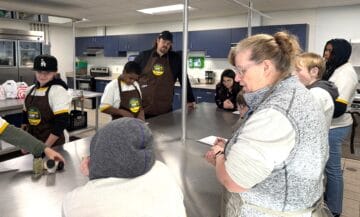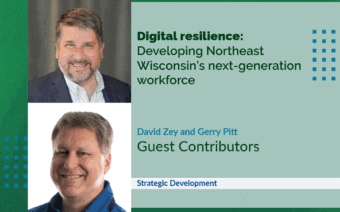
November 16, 2022
ASHWAUBENON – According to the Asthma and Allergy Foundation of America, nearly 32 million people in the United States are affected by food allergies, with 15%-20% of the population affected by food intolerances – the most common being milk, soy, eggs, wheat, peanuts, tree nuts, sesame, fish and shellfish.
Amulet makes the world’s smallest and fastest consumer allergen detection device – capable of sensing everything from pathogens in the air to pesticides to produce.
And in early 2023, Co-founder and CEO Abi Barnes said its consumer brand – Allergy Amulet™ – will launch at full scale, much to the joy of anyone with food allergies.
Amulet, headquartered in Madison, is the creator of Allergy Amulet, the TitletownTech-backed consumer brand with a signature wearable that tests for common allergenic ingredients in approximately one minute.
Barnes said its groundbreaking and patented technology fits with a keychain or necklace accessory, making it easy to manage life with food allergies and intolerances.
She said Amulet’s pre-order launch of its Allergy Amulets sold out in four hours, with plans of shipping units in summer 2022.
However, the company needed to switch manufacturing of the device to a manufacturer that could scale with their anticipated growth, so the full launch is targeted for early 2023.
And though the delay isn’t what Barnes originally anticipated, she is quite pragmatic in response.
Getting off the ground
Since establishing the company in 2016, the attorney, author and lifelong food allergy sufferer said she has learned a lot about establishing – and leading – a sensor tech company.
Barnes said she had long had the idea for something like the Allergy Amulet to help those with food allergies quickly determine if a food contained their allergen.?
“When you have a food allergy, you are constantly thinking about it,” she said.
It wasn’t until she connected with Dr. Joseph BelBruno, a Dartmouth College professor of chemistry, who could make it a reality that Barnes said the idea took off.

Allergy Amulet’s patented technology fits on a keychain or necklace. Submitted Photo
That later led to acceptance into two business accelerator programs, “catapulting us to our first institutional financing that led to our company taking off in earnest in 2016,” she said.?
Barnes said those accelerators first included Mass Challenge, a Boston-based cohort, followed by gener8tor, a nationally ranked venture capital firm and accelerator in Madison.
She said she recognized securing funding was essential to the business’s ability to develop to the next level.
“Especially as women, we are over-mentored and undercapitalized,” she said. “There are a lot of willing mentors out there, but we need more funding sources.”
This, as well as more diversity, Barnes said are key pieces to supporting companies in their early days.
“The capital we received got us off the ground in 2016 and allowed us to secure lab space, hire our first scientists and gave us a fighting chance at securing preliminary data that the technology detected allergens and creating a prototype,” she said.
As with many entrepreneurial endeavors, Barnes said it was a balancing act.
With one accelerator, she said she was serving as a summer associate at a law firm and traveling to Boston to participate in MassChallenge.
With the other, Barnes said she was living in Connecticut, finishing up graduate school, often attending classes in the mornings and flying to Madison to participate in gener8tor.?
“Knowing what the statistics of startup failure are, I was wide eyed about the possibility we could fail,” she said. “I was pragmatic and pursued both my law degree, my master’s degree and took the bar exam while fundraising for the business.”
Barnes said much of a job as a lawyer and as an entrepreneur is to mitigate risk and maximize outcomes.
“I knew being a licensed attorney would benefit the business as well,” she said.
Just the beginning
After launching the Allergy Amulet, Barnes said she and her team realized food allergies were the tip of the iceberg.
She said they wanted a company that reflected the broad possibilities of their technology, and as a result of outreach by food manufacturers, began exploring the Amulet’s sensor technology for applications in food safety, clinical diagnostics and environmental contaminants.
“We were seeing a lot of inbound interest from food manufacturers in using the technology to test for contaminants,” Barnes said. “A lot of the players in the food manufacturing space use immunoassay-based kits, but our technology offers greater portability, faster detection times and lower costs. There is an opportunity to integrate our tests into existing protocols at food manufacturing sites.”
//s3.amazonaws.com/appforest_uf/f1668628019530x745472105695310600/richtext_content.webpAbi Barnes
?Barnes said this work is being conducted under Amulet’s commercial brand, known as Amulet Scientific, which launched in February 2022.
Using the world’s smallest handheld and battery-powered potentiostat, she said the detection platform identifies a range of molecular targets, including food toxins and environmental contaminants.
“With the Allergy Amulet, we have a miniaturized potentiostat with chips inside the sampler that detect food allergens and food contaminants,” she said.
Barnes said at its core, Amulet is helping shine a light on invisible threats with these sensors, first by helping consumers to see if foods contain allergens with its consumer brand, and now helping companies and manufacturers protect the food supply chain with its commercial brand.
“The inspiration for Amulet as a company was around food allergies, but we recognized the potential the technology had to go beyond allergies to food safety risks,” she said.
At this juncture, with Amulet Scientific’s work in the enterprise space being so new and the Allergy Amulet’s full launch imminent, Barnes said she isn’t sure which market will prove to be more fruitful for the company.?
“They are two large markets, and when you’re an entrepreneur at our stage, you want to be nimble, keep the doors open and explore the opportunities, because you may have to pivot,” she said. “Both markets are promising and large, and both could be home runs. Right now, we are primarily focused on the consumer launch and exploring potential strategic opportunities with a few food manufacturers.”
After the Allergy Amulet launch, with pre-orders shipping first, Barnes said she is excited to reopen the shop on the company’s website.
Headquartered in Wisconsin
Barnes said she’s happy to have the company’s headquarters in Wisconsin (its lab remains in Boston), as it’s proving to be the right environment.
“We moved Amulet to Wisconsin for a number of reasons, but what has kept us here was largely our ability to keep burn down,” she said. “We considered moving to Boston to be closer to our lab, but we would have doubled our burn, and when you look at your odds of survival as a startup, the key is staying lean. Venture capitalists always focus on the unicorns, but we tend to undervalue the camel. And if San Francisco is the land of unicorns, Wisconsin is a haven for camels.”
Quoting Al Pacino, “starting a company, like football, is a game of inches,” she said. “The margin for error is small, and you have to claw like hell for those inches. But the reward of those inches – in our case, bringing something to life that never before existed, and that could potentially save lives and make the world a slightly better place – that’s what it’s all about.”
 Daigle Brothers – Building Wisconsin one steel column at a time
Daigle Brothers – Building Wisconsin one steel column at a time From the football field to the kitchen
From the football field to the kitchen







